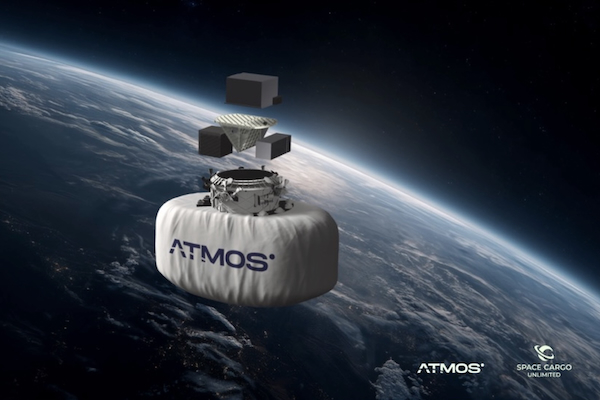 Space Cargo Unlimited and ATMOS Space Cargo;
Credit: Space Cargo Unlimited/ATMOS Space Cargo
Space Cargo Unlimited and ATMOS Space Cargo;
Credit: Space Cargo Unlimited/ATMOS Space Cargo
On Wednesday 12 November 2025, Luxembourg-based company Space Cargo Unlimited and ATMOS Space Cargo (ATMOS) announced the signing of a Mission Order for their first integrated PHOENIX–BentoBox mission.
According to Space Cargo Unlimited, the announcement marked the beginning of a seven-flight programme that will establish a new operational model for routine commercial, station-independent access to and from orbit for research and manufacturing in microgravity.
Space Cargo Unlimited noted that the mission will demonstrate the integration of its BentoBox platform inside ATMOS's next-generation PHOENIX 2 free-flyer re-entry vehicle, under a coordinated operational framework that combines orbital logistics, payload operations in Low-Earth Orbit (LEO) and recovery in one end-to-end commercial service. PHOENIX 2 will launch as part of a rideshare mission on a SpaceX Falcon 9 rocket in 2026.
During the multi-week mission, Space Cargo Unlimited will oversee end-user payload operations in orbit through its BentoBox platform, while managing stable environmental conditions within the PHOENIX 2 payload bay, distributing power to end-user payloads, and facilitating continuous data exchange through ATMOS's on-board communications and ground segment infrastructure. ATMOS will deploy its inaugural PHOENIX 2 re-entry capsule, and execute launch integration, orbital mission control operations, telemetry and command services, autonomous de-orbit, re-entry and recovery logistics near Santa Maria in the Azores, Portugal.
BentoBox, designed and operated by Space Cargo Unlimited, serves as the mission’s payload operations layer, equipping PHOENIX with a controlled, service-oriented environment for commercial and research users. The BentoBox system manages payload-level power distribution, data handling and autonomous experiment sequencing, ensuring that each customer’s mission profile is executed precisely as designed within a stable, thermally regulated microgravity environment.
"This first mission showcases not just our hardware, but our business model," said Nicolas Gaume, Co-Founder and CEO of Space Cargo Unlimited. "The mission is already seeing strong commercial traction, with payload opportunities largely allocated and additional engagements underway. This flight will raise TRLs (Technology Readiness Levels) for our customers, validate their models and demonstrate the potential of space as a factory for Earth.”
"The combination of BentoBox's autonomous payload operations with PHOENIX 2's reusable orbital free-flyer and cutting-edge re-entry technology creates a complete end-to-end service that sets new benchmarks for space logistics”, added Sebastian Klaus, Co-Founder and CEO of ATMOS Space Cargo. "Together ATMOS and SCU are building the infrastructure that will make microgravity manufacturing as routine and accessible as terrestrial production, strengthening Europe’s sovereign access to and from orbit in the post-ISS era."
Space Cargo Unlimited recently secured €27.5 million in Series A funding, described as the largest in-space manufacturing round in Europe to date. The investment was led by Expansion Ventures with support from Eurazeo and included participation from the European Innovation Council, the European Investment Bank, the Luxembourg Future Fund II and private investors through the Tudigo platform.








